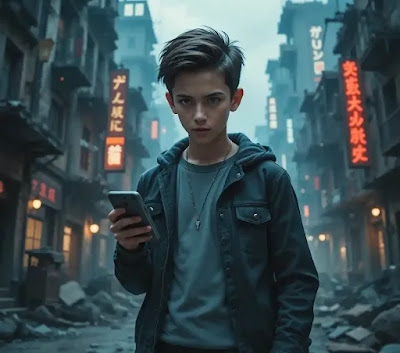Smart Boy vs Smartphone: The Summer Arif Found Balance
A gentle tale for parents and children alike—about curiosity, screens, and the quiet power of choosing what really matters.
1. The Gift That Glowed
Eleven-year-old Arif Hasan lived in a sleepy Bengali village stitched between golden rice fields and the winding Jalangi River. On the first morning of his summer break, he bolted out of bed to the aroma of puffed-rice muri and jaggery. It was also his birthday. His father—who drove the only bus that ran to Krishnanagar—handed him a small box wrapped in yesterday’s newspaper. Inside glimmered a second-hand smartphone with a faint crack near the ear-speaker. Arif’s eyes widened; the screen’s glow seemed brighter than sunrise.
2. A World in His Pocket
By lunchtime Arif had discovered Google Lens (which solved math faster than his teacher), YouTube cricket highlight reels, and a game called Space Fruits. That evening he skipped gully-cricket for the first time. When his friends called, he waved them off—thumbs glued to virtual watermelons he had to slice before they hit the ground. The score climbed; the sun sank.
3. The Vanishing Tables
A week later, Arif’s mother Mala noticed something odd: while measuring rice, Arif stumbled multiplying 7 × 8—something he had rattled off effortlessly since class three. The next day his workbook came home with RED MARKS. “Math puzzles are boring,” he shrugged, eyes on his phone. Mala sighed and decided to visit Mastermoshai, the retired schoolteacher who lived near the banyan tree.
4. A Bold Experiment
Mastermoshai listened patiently, then smiled behind his grey moustache. “Give him a choice,” he advised. That night Mala placed the phone on the dining table beside a brown diary and a pack of colour pencils.
“Two weeks,” she told Arif softly. “Sketch the world you see; write the world you feel. If you last, the phone returns—and you set the rules.”
5. The First Three Days: Restless Fingers
Day 1 crawled. Arif’s thumbs twitched phantom taps. He counted ceiling-fan spins, sulked, kicked pebbles. Day 2 he wandered to the riverbank, sketchbook in hand. A kingfisher swooped turquoise across the water. His pencil tried to catch that flash—line by shaky line. Day 3 he opened the diary and wrote:
The river keeps secrets.
Phones tell them too quickly.
Maybe secrets taste better slow.
6. Rediscoveries
By Day 6 Arif joined gully-cricket again. Bat meeting ball sounded richer than any notification ping. On Day 8 he visited Mastermoshai, solved riddles on a chalkboard, and recited the nine-times table backwards. The old man clapped like thunder.
Meanwhile Mala watched her son’s eyes sparkle differently—slow fire replacing blue glare.
7. Negotiations at Dawn
The fourteenth morning arrived. The phone lay on the table again, screen dark, almost shy. Arif took a long breath. “Ma,” he said, “I want it back… but not every minute. Let’s trade: one hour of study earns me thirty minutes of phone. And Sundays—phone-free, promise!” Mala agreed, adding one clause: “No phone after 8 p.m., and we eat dinner together. Deal?” Arif shook her hand—grown-up style.
8. The Phone’s New Job
The smartphone became a tool, not a tyrant. • Morning: Duolingo Bengali-to-English lessons. • Noon: photographing insects for science class. • Evening: 30 minutes of Space Fruits after homework review by father. At 7:55 p.m. an alarm chimed—“Time to land, pilot!”—and Arif docked the phone on a shelf outside his room.
9. Ripples of Change
Word spread. Friends mocked at first—“Arif’s on leash!”—but curiosity won. Soon three classmates started diary swaps, comparing drawings instead of high scores. Mastermoshai led Sunday math-meets under the banyan tree. Parents brought lemonade; children brought questions. Laughter zig-zagged with chalk dust.
10. Monsoon Exam Results
When school reopened, Arif’s math paper showed 48 / 50. His teacher scribbled, “Excellent comeback!”. Arif shared the brown diary in class; classmates marvelled at sketches of kingfishers and rice fields painted in pencil shades.
That evening he posted a photo of the diary on social media with the caption: “Offline adventures—battery 100 %, signal full.” Within an hour the post garnered more “likes” than any gaming screenshot he’d ever shared.
11. Epilogue: Brains Brighter Than Screens
The smartphone still buzzes in Arif’s pocket, but it no longer steals time; it serves curiosity. On crisp evenings he sits by the Jalangi, phone beside diary, deciding which lens—glass or graphite—will tell the day’s story better. Some nights the phone wins; other nights the diary does. Balance, after all, isn’t a final destination—it’s a daily dance. And in that dance, a smart boy leads, while a smartphone follows.


